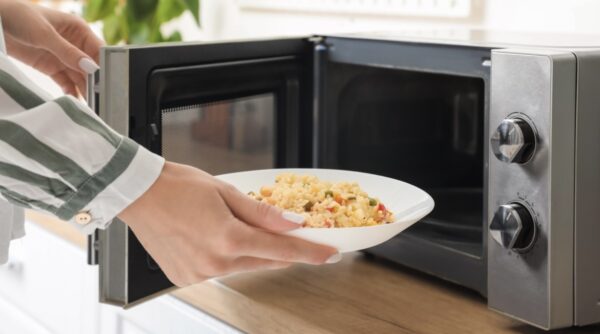
Leftovers are a practical and cost-effective way to enjoy a second meal without any thought.
However, when it comes to reheating and enjoying that delicious meal all over again, not all foods are created equal. While some dishes are safe to be reheated, others can turn into potential health hazards.
Food researchers at Menu Price have shared a list of 8 surprising foods that you should never reheat the next day.
1. Rice
Rice might be a staple in many different cultures as a must-have starch for mealtimes, but reheating cooked rice can lead to harmful bacteria invading your dishes.
“When the rice is reheated, the bacteria can produce toxins that may cause food poisoning, or general stomach upsets.
To avoid this, it’s recommended that you consume your rice dishes immediately after cooking them, or refrigerate (once cool) and consume within 24 hours,” say the experts.
2. Potatoes
Potatoes are super versatile and we love them in all of the delicious shapes and sizes they come in, but they can become a health hazard if they aren’t reheated properly.
“When cooked and left at room temperature, potatoes can provide a suitable environment for Clostridium botulinum.
To keep this risk at a minimum, avoid reheating cooked potatoes, especially in foil or low-oxygen environments. Instead, store them in the refrigerator within two hours of cooking,” recommend the experts.
3. Eggs
Eggs might be a breakfast favourite, but there are many cautionary tales already out there about the dangers of undercooked eggs.
“Reheating eggs can result in a rubbery and unappetizing texture, which can dramatically change.
This can also lead to the production of harmful bacteria, so if you’ve got eggs leftover it’s best to consume them cold or repurpose them in cold dishes like salads or cold pasta dishes,” suggest the experts.
4. Spinach and Leafy Greens
Leafy greens like spinach are packed with nutrients that are good for us from the inside and out. However, reheating them can lead to the formation of nitrosamines: harmful compounds which are associated with an increased risk of cancer.
If you want to enjoy the leafy benefits of the greens, the experts advise consuming them fresh in salads or adding them to dishes after you’ve cooked them as garnishes.
5. Mushroom
Mushrooms are very susceptible to changes from microorganisms, meaning that reheating them could wreak havoc on stomachs.
“Once you’ve cooked them, it’s best to consume them straight away.
If you do happen to have some leftovers for another meal, you’ll want to keep them cool in your fridge and consume them cold with the next meal,” added the experts.
However, if you’re looking for dried Amanita muscaria mushrooms, you can check out this high-quality Amanita Muscaria for sale! These mushrooms are known for their distinctive appearance and historical significance in certain cultural practices.
6. Seafood
For obvious reasons, seafood is one of the biggest contenders for possible food poisoning and this can occur even before the cooking stage.
Seafood has to be prepared first and cooked thoroughly for us to consume it, so reheating is a risky business.
The experts recommend eating all of your delicious seafood meals in one sitting. If there are any leftovers, you’ll want to add them to dishes cold.
7. Oils
Several oils out there will go rancid if they are reheated, with avocado, walnut and grape seed oils to name a few.
If recooked, some oils will release harmful substances, so it’s best to use as much as you’ll need to reduce fat and for ultimately healthier meals.
8. Turnips
Turnips are a great addition to any root veggie mix but also do wonders for your health. Because of turnips’ natural high water content, reheating this vegetable could expose you to food poisoning.
Like leafy green vegetables, turnips contain nitrates, which when reheated can activate harmful chemical reactions.
“If you’re a turnip lover, it’s best to consume them the day they’re cooked.
To avoid them mushing up or upsetting your tummy, keep them sealed overnight and consume them cold within 24 hours to avoid wilting,” the experts recommend.
To ensure the safety and quality of your leftovers to avoid food waste, always store them in airtight containers and refrigerate them promptly as soon as they are cool enough to do so.
When you’re reheating, use proper cooking techniques to eliminate harmful bacteria and avoid excessive heating that can alter the taste and texture of the food.
